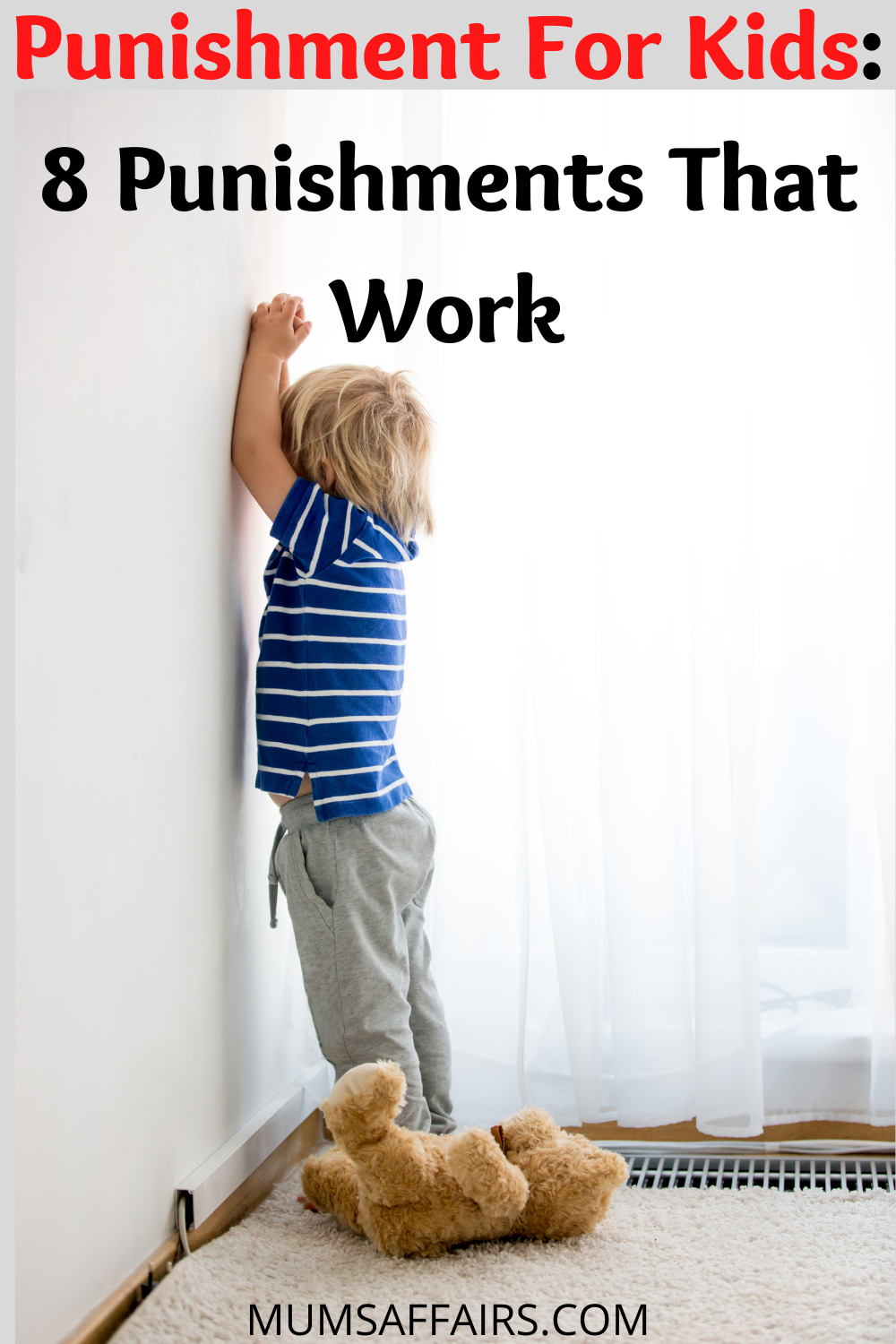
Punish your kids without making them hate you. Every parent has felt the need to punish their kids at some point or another. Whether it’s punishment for lying, misbehaving in public, or just because you really need them to listen to you right now, it’s an important part of life as a parent to know how to get your message across without completely breaking your relationship with your children.
Punishment is an essential part of child-rearing, but it can be difficult to know how to punish your kids without making them hate you. The worst part about being punished is when the punishment isn’t effective and doesn’t actually deter bad behavior from occurring again in the future.
We’ve come up with 8 different ways to punish your kids that won’t make them hate you forever, but will still have the desired effect of encouraging them to behave better in the future. With these 8 types of punishments for kids, hopefully, you won’t need to punish them as often!
How do you punish a child without hurting them?
There are a few ways to punish your child without hurting them and making them hate you. One way is to take away something they love, such as their favorite toy or privilege. Another way is to have them do something they don’t enjoy, such as cleaning up their room or doing a chore.
You can also try using positive reinforcement, such as rewarding them when they behave well. Finally, make sure that your punishments are consistent and fair.
How do you discipline a child without scolding?
There are a few ways to punish your kids without making them hate you. One way is to take away something they love, such as their favorite toy or game. Another way is to give them a time-out, where they have to sit in a corner or in their room for a set amount of time.
You can also make them do extra chores around the house, such as cleaning up their room or taking out the trash.

8 Ways to Punish Your Kids Without Making Them Hate You
1. Make them write their misbehavior 100 times
A punishment that will teach your child the lesson they need without making them hate you is key. Making them write their misbehavior 100 times is a great way to do this. It will help them understand the severity of their actions and make them think twice before doing it again.
Make them pay for what they did: If your child broke something or left messes around the house, get out their piggy bank or cash register, and have them spend time counting up how much money they owe you. Have them pick up all the things they broke or messed up as well.
They’ll know better next time! Or make them work at a local animal shelter so they can see firsthand what happens when someone doesn’t care about an animal. Put it on their bedroom door:
The best way to let your kids know you’re not happy with their behavior is by letting them know they can look forward to more consequences if they don’t change it.
2. Tease them mercilessly

Do you want your kids to grow up to be confident and strong? Then start teasing them mercilessly. It might seem mean, but it’s actually one of the best things you can do for them. Teasing builds resilience and a thick skin, both of which will come in handy later in life.
It also teaches them how to manage their emotions and how to deal with people who are trying to provoke them or make fun of them. And when they get older, they’ll know how to be funny themselves—and that’s one of the most attractive qualities in a partner!
There’s no need to go overboard with this one though: just a few lighthearted barbs here and there should suffice. If you really want to push the envelope, pick on something other than appearance.
We’re not telling you to laugh at your child if they accidentally spill food on their shirt, but let’s say she finds out her teacher is moving away and she was looking forward to seeing him again next year. The next time she brings it up, make some crack about how he’s so overrated anyway (even if he is an amazing teacher).
It won’t take long before she starts feeling more comfortable about laughing at herself.
3. Take away something they value highly

One way to punish your kids is by taking away something they value highly. For example, if they love their phone, you can take it away for a day or two. This will teach them that there are consequences for their actions and that they need to think about what they do before they do it.
Another thing you can do is tell them they have to work off the time by doing chores around the house. For example, if they watch TV all day long instead of doing homework, then the next day they will be watching TV while cleaning up after dinner.
They might not like this at first but soon enough they’ll learn how to balance things out in their life so everything gets done. Also, don’t forget to make sure you praise them when they get their homework done on time! A good punishment for kids who refuse to listen is grounding them.
If your child doesn’t want to go outside because it’s raining, for example, say no more than an hour outside and maybe an hour of reading. If they’re really bad and won’t stop talking back or running away from home, they may have to spend time in juvenile detention until they can show some improvement.
4. Remove all privileges

One way to punish your kids is to remove all of their privileges. This means no TV, no video games, no phone, and no going out with friends. This might seem like a harsh punishment, but it will get their attention. Just make sure that you don’t do this for too long, or they’ll start to resent you.
And before you know it, they’ll be back to doing the things that got them in trouble in the first place.
There are other ways to discourage bad behavior without removing any privileges at all! Here are eight ways: -Positive reinforcement: Tell your child what they did well, so they’ll try to repeat the behavior again.
Time-outs:
If a child misbehaves repeatedly when told not to, give them five minutes away from the situation (or have them sit on their hands). For older children, time-outs can take up to 15 minutes. Time-outs work best if done immediately after the child does something wrong.
Make sure you stay in the room and ignore them during their time-out; this prevents power struggles between parent and child. After the allotted time has passed, ask them why they think it’s important to behave well and explain how there are consequences for poor behavior.
Another option is to send them to another room where they can think about what happened until they calm down.
5. Ground them in every way possible

When your kid breaks a rule, it’s important to enforce consequences so they know that their actions have real-world implications. But you also don’t want to be too harsh, or they’ll start to resent you. The key is finding a balance between the two. A time-out can work wonders if your child needs to learn how to regulate themselves.
In this situation, making them sit in a room by themselves for 10 minutes can help them think about what they did wrong and how they can fix it next time. If your child has been disrespectful or disobedient, enforcing strict boundaries may be necessary. For example, grounding them for a week.
Make sure not to let your kids leave the house during this time period, even if they’re allowed otherwise. And make sure not to punish your kids when you’re mad at someone else — only when they’ve done something wrong (even though it might seem like all of their actions are punishable).
6. Make your punishment physical

1. Start by making your punishment physical. This will show your child that you mean business and that they need to take you seriously.
2. Decide what the punishment will be ahead of time so you don’t have to make it up on the spot.
3. Be consistent with your punishments. If you only punish your child sometimes, they won’t take you seriously.
4. Be fair with your punishments. Make sure that you’re punishing every kid in the family equally and not just your child.
5. Make sure the punishment is something small enough for them to succeed when they try again next time.
6. Remember that punishing a child is always better than rewarding them when they do something wrong.
7. Make sure your punishments are age-appropriate – an 8-year-old should never get spanked like a 2-year-old would, for example.
8. Do as much teaching as possible during the punishment. For instance, if your daughter was supposed to clean her room but she didn’t finish because she was playing video games instead, then tell her how to organize her toys while she’s cleaning.
9. Use negative reinforcement sparingly – if they want a lot of candy and ice cream, then you can say No way! I’m going to give you veggies instead.
10. Keep consequences simple: no more TV or internet for two days is good enough.
7. Force them to apologize

When your child breaks a rule, make them apologize—not just to you, but also to anyone else who was affected by their actions. This will help them understand the importance of taking responsibility for their actions and showing empathy for others.
For example, if they hit another kid on the playground, they’ll have to explain what happened in front of that other kid and apologize to him or her as well. The last sentence should be Remember that this is never an excuse for abuse. Hitting kids isn’t ever OK.
If it’s happening in your house, reach out to professionals like Childhelp’s National Child Abuse Hotline at 1-800-4-A-CHILD (1-800-422-4453) or call 911 immediately. It’s not easy, but there are resources available to help you through this difficult time.
8. Get into trouble with their teacher or boss on their behalf

We’ve all been there: our kids do something that gets them into trouble with their teacher or boss, and we have to suffer the consequences right alongside them. But what if there was a way to punish your kids without making them hate you? Here are 8 ways to do just that.
1. Go talk to the teacher or boss on behalf of your child. Sometimes they’ll cut you some slack because they understand how hard it is being a parent sometimes.
2. Say I’m sorry for what your child did and take responsibility for their actions by apologizing for not teaching them better manners/keeping an eye on them/etc.
3. Ask for suggestions on how to improve their behavior next time – this might help prevent another incident from happening in the future!
4. Point out to them that they’re lucky their teacher didn’t give them detention.
5. Look at the bright side – maybe your kid’s misbehavior will make someone else’s day less difficult (the teacher’s).
6. Don’t get mad at your child for doing something wrong when you know darn well you’re guilty of doing so yourself (you know who you are!).
7. If the punishment doesn’t fit the crime, ask for another solution so no one has to suffer.
8. Understand where your child is coming from and try to figure out why they acted that way – sometimes parenting means helping your kids grow up while still having fun together.
Final Thought On 8 Ways to Punish Your Kids Without Making Them Hate You
Conclusion There are plenty of ways that parents can punish their kids without having them hate you. And what’s more, many of these punishments will have your kids actually thank you for it in the end. so feel free to try out these 8 useful tips and see how they work perfectly.
Pin Me For Later!


